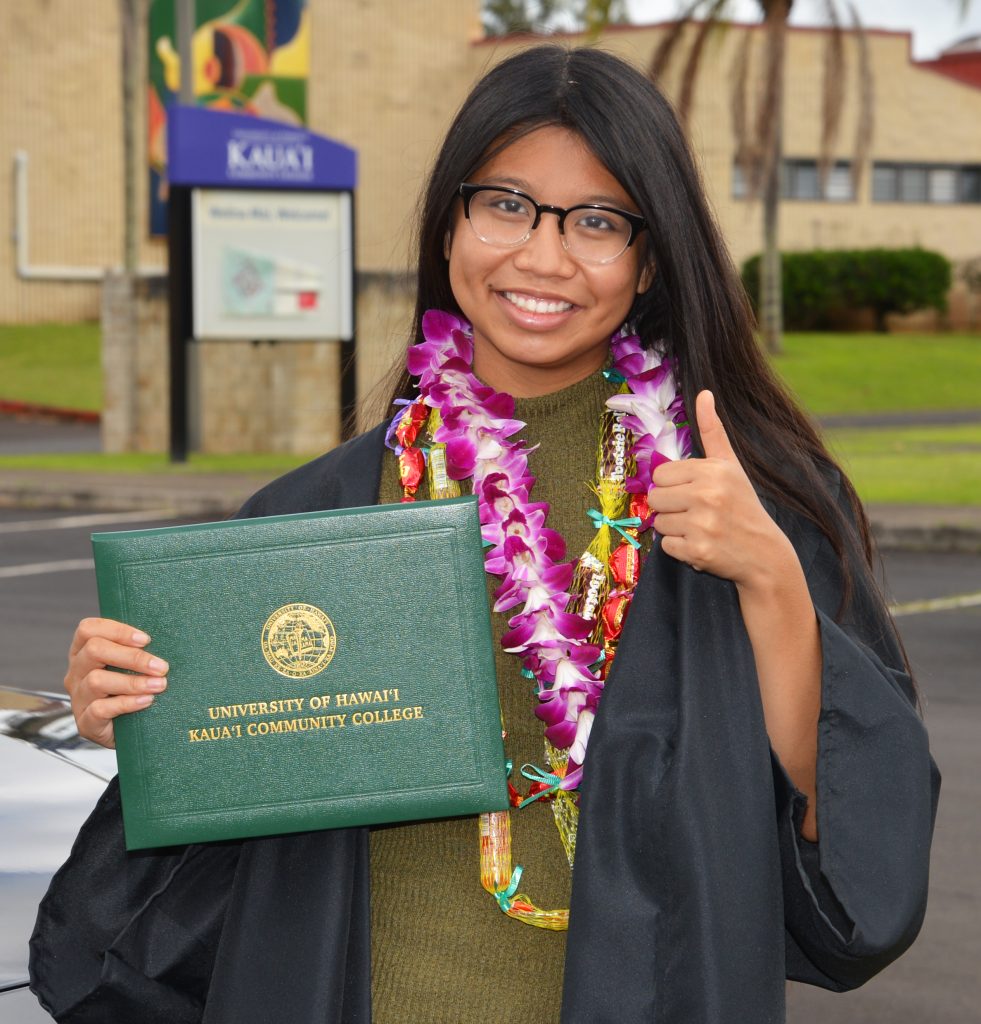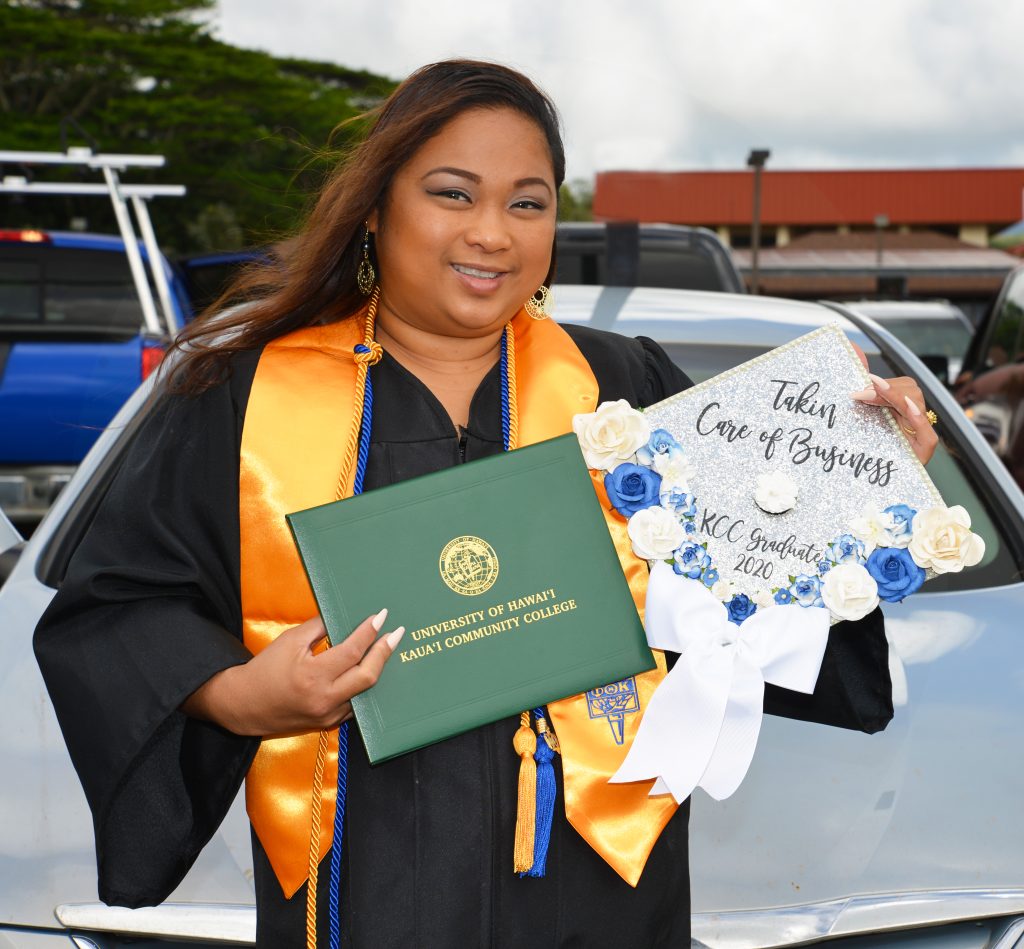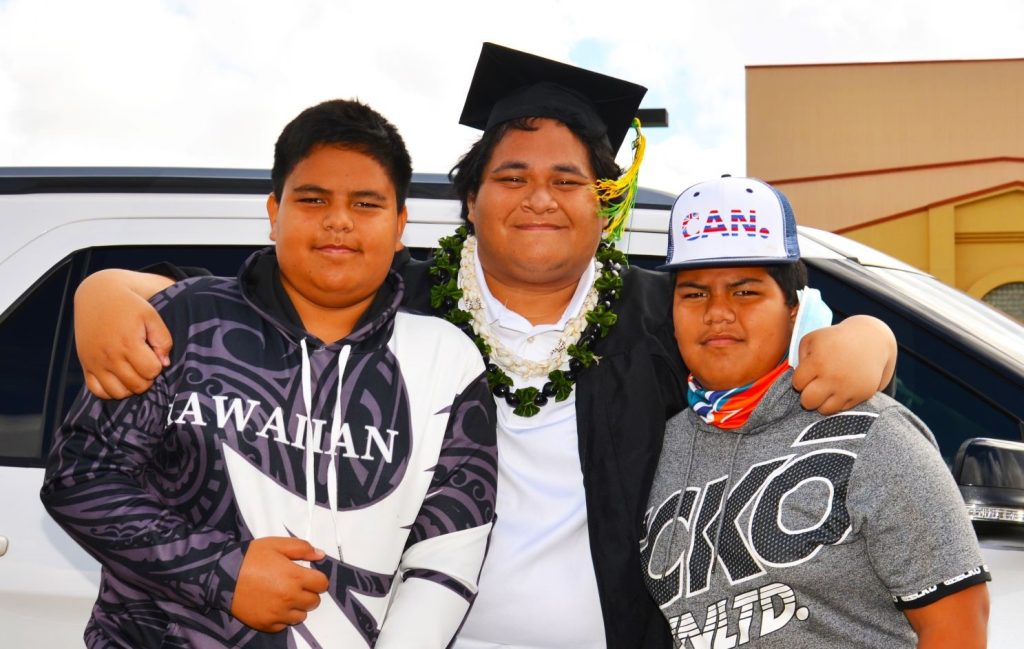KCC Sees Record Graduation Rates in 2020-21 Despite Challenges of Pandemic


Amid a global viral outbreak that was still gaining momentum, forcing educational institutions across the board to adapt and change how they delivered instruction, Kaua‘i Community College in Līhuʻe was not only able to provide what its students needed to succeed, it went above and beyond.
KCC had its highest-ever three-year, full-time, first-time graduation rate, 32.4%, and record four- and five-year rates, 19.3% and 18.5%, respectively, for part-time first-time students by the end of the 2020-21 academic year, the first impacted by the COVID-19 pandemic, according to a report to the UH Board of Regents by UH President David Lassner last month.
Lassner reported that the university’s 10 campuses throughout the state achieved record highs in graduation and retention rates during the 2020-21 academic year.
“We have not let COVID defeat us or our students, and we need to keep improving through and past COVID,” said Lassner during his report, adding that setting these records shows UH is moving in the right direction on each of its campuses. “And we don’t get to where we want to be if we don’t continuously improve.”

The 2020-21 three-year, full-time, first-time graduation rate at KCC was a 6% increase compared to the 25% rate for the 2019-20 academic year. A total of 307 students at the community college graduated with degrees or certificates in 2020-21.
“(The) graduation rates tell a remarkable story of dedication, creativity, perseverance and resilience,” KCC Chancellor Joseph Daisy told Kaua‘i Now. “It just makes me proud for the hard work and efforts of our students to persist and to graduate.”
Daisy said graduation rates are an important performance measure that tells the college that its students are successfully completing their programs.
“It’s a measure of success and performance,” he said.
Even more than that, Daisy said, graduation rates represent the number of people on Kaua‘i who are moving forward with their new careers and pursuing their dreams. Graduating and completing a degree or certificate program opens doors for KCC graduates to move on, whether it’s transferring to complete a bachelor’s degree or go to work.
“It’s a milestone for them,” he said.
Daisy said 80% of the college’s student body attends part-time. Many students have regular jobs and families.
“So many of our students are working hard to fit education into their really already busy lives,” the chancellor said. “So that means it takes longer to complete their degree. And that’s OK.”
Because of that, the three-year graduation rate gives the college a better idea of how well the majority of its students are doing.
“It’s an important statistic, and it shows that our students are, you know, kind of sticking with it and finishing their degree,” Daisy said.
The metric also tells Daisy how well KCC is delivering on the range of support services it provides to students to help them succeed.
“I think it shows that we’re doing our jobs well, and we’re providing a pathway to a college degree, and we’re supporting our students all along, all along their path to graduation, so they can achieve their goal of graduating college and pursuing what’s next in their professional lives,” Daisy said.
KCC’s record graduation rates didn’t happen easily.
The pandemic presented an extraordinary and unprecedented challenge for the college as it did for all other sectors of life around the island, Daisy said. He credited the college’s success to its faculty and support staff, who have been extraordinary in their efforts to give students the necessary tools to complete their degree or certificate program while having to navigate the multitude of changes caused by the pandemic.
“It came through dedication and commitment of faculty and staff to keep our students engaged,” Daisy said.
He said the school provided financial and other support to students facing challenges and hardship amid the pandemic, needed technology so students could continue their classes and a range of teaching styles that included some traditional face-to-face classes where it was necessary, particularly in a number of KCC’s career and technical education programs; online remote learning opportunities; and some classes that are a hybrid of both.
“So we really try to provide a broad range of opportunities for our students to remain on course to successfully complete their degrees,” Daisy said.
The record graduation rates for 2020-21 tell him how students and staff have met the challenges of the pandemic — the words resilience, caring and community came to his mind.
“I think this increase in our graduation rate speaks to the drive, by both our students and our faculty and staff,” Daisy said. “I’m incredibly proud of our students for not letting the pandemic get in the way of their completing their college education. The effort that our faculty put forth to pivot how they teach their classes and by our staff to support all these changes, has really been nothing short of amazing.”
The challenges of the pandemic have been immense for the UH system as a whole; however, the vast majority of the students, faculty and staff have risen above.
“UH leadership has, again and again, commended our faculty and staff and students for their amazing resiliency during the pandemic,” UH spokesman Dan Meisenzahl told Kaua‘i Now in an email. “It takes an entire community, and our community has and continues to weather an unprecedented crisis without interruption. Our faculty never stopped teaching, our students never stopped learning and graduating and our staff supported both along the way.”
Daisy thinks KCC is on the right track after several years of improving graduation rates, and by continuing to provide students support and removing barriers to their success, the college will only improve.
“It’s important we continue to engage and listen to our students and our community about all the challenges that they face and we work with them to address those challenges, again, to keep them engaged and on the path to success, on the path to their completing their degree program or certificate of achievement,” Daisy said.
Meisenzahl said the keys to improving graduation rates are continuing to identify and address unnecessary hurdles and choke points in the system that can delay timely graduation and providing continuous support from when a student commits to attending a UH campus until they graduate.
“UH’s mission is to provide access to quality, affordable higher education to people of Hawai‘i, as there is no better way to lift oneself to a higher socioeconomic status than education,” he said. “Our job is to educate and graduate, as an education is the great equalizer in our country.”
Daisy said college is really all about optimism.
“It’s a belief that you can change your future by learning more. And that’s why our students come to us,” he said. “As Kaua‘i’s community college, we really share in that optimism — in our students’ optimism and the optimism of the community. And we look forward with our ‘ohana to a resurging Kaua‘i, to a Kaua‘i that continues to grow and support one another. It has been a remarkable two years I think for all of us. But then, you know, those words resonate with me — resilience, caring, community. And we’ve seen it everywhere on this island.”
Graduation, retention and success rates and other data for the 10 UH campuses can be found on the UH Institutional Research, Analysis and Planning Office website.



